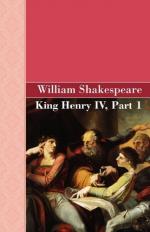|
This section contains 604 words (approx. 2 pages at 400 words per page) |

|
Source: "A Shakespeare All too Modern?" in Arizona Quarterly, Vol. 20, No.4, Winter, 1964, pp. 293-316.
[Weisinger argues that Hal is "the ideal hero" and that his reformation is calculated. Weisinger states that Hal takes on the role of the Prodigal Son in order to increase the political impact of his transformation from an irresponsible boy into a good, responsible, legitimate future king. Weisinger also comments on how Hal uses Falstaff to accomplish this dramatic reformation.]
. . . In the character of Prince Hal, Shakespeare created the ideal hero. Confronted with the necessity of ridding the nation of a legitimate but bad king, a man morally corrupt, incapable of decisive action, and without the slightest sense of his regal obligations, Bolingbroke [Hal's father, Henry] seizes the throne at the cost of his own troubled conscience; he becomes King Henry IV, the good but illegitimate king. To his son he bequeaths the...
|
This section contains 604 words (approx. 2 pages at 400 words per page) |

|




